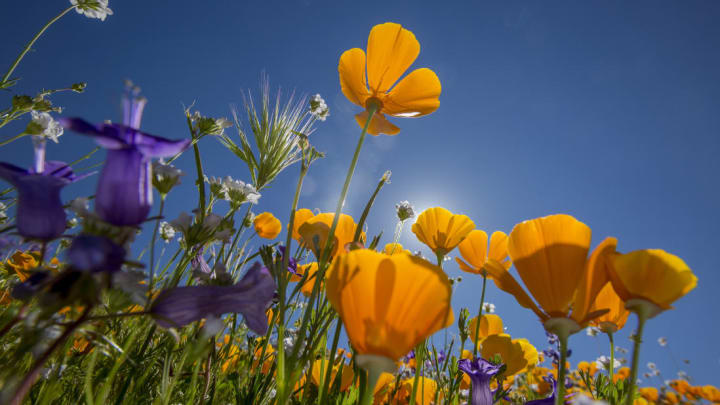The UK is emerging as a global leader in the effort to reduce our dependency on pesticides. In November 2017, the nation moved to restrict a class of pesticide that’s deadly to bees, and now 15 farms across the country are testing a natural supplement to the chemicals. As The Guardian reports, colorful strips of wildflowers have been planted among crops as a way to combat pests.
The floral stripes add vibrant pops of color to the farmland, but they’re not there for show. By planting wildflowers in the fields, farmers hope to attract predatory insects like hoverflies, parasitic wasps, and ground beetles. These are exactly the type of bugs farmers want flocking to their property: They don’t eat crops and instead prey on the insects that do. With more natural predators to control pest populations, farmers may be able to reduce their use of harmful pesticides.
The wildflower strategy isn’t entirely new. Farmers already knew that planting borders of wildflowers around their fields is an effective way to lure in good insects, but this method still leaves the center of their farms vulnerable. By dispersing flowers throughout the area, they can broaden the predatory insects’ range.
The 15 farms planted with wildflowers last fall are part of a trial run put together by the Center for Ecology and Hydrology. The organization will monitor the farms for five years to see if the experiment really is a viable alternative to pesticides. In the meantime, farmers will have plenty of room to plant and harvest as usual, with the flower beds only taking up 2 percent of their land. The selected flowers include oxeye daisy, red clover, common knapweed, and wild carrot.
There's a long list of reasons for farmers to phase out chemical pesticides, from the damage they do to local wildlife to the threat they pose to our own health. As lawmakers around the world begin to crack down on them, you can expect to see more natural alternatives gain attention.
#Wildflower #stripes used in #UK experiment to combat crop #pests with their #natural #predators >>> https://t.co/rsxZIjdi78 pic.twitter.com/BtL8zDy7sJ
— inputforcolor (@inputforcolor) January 31, 2018
[h/t The Guardian]
